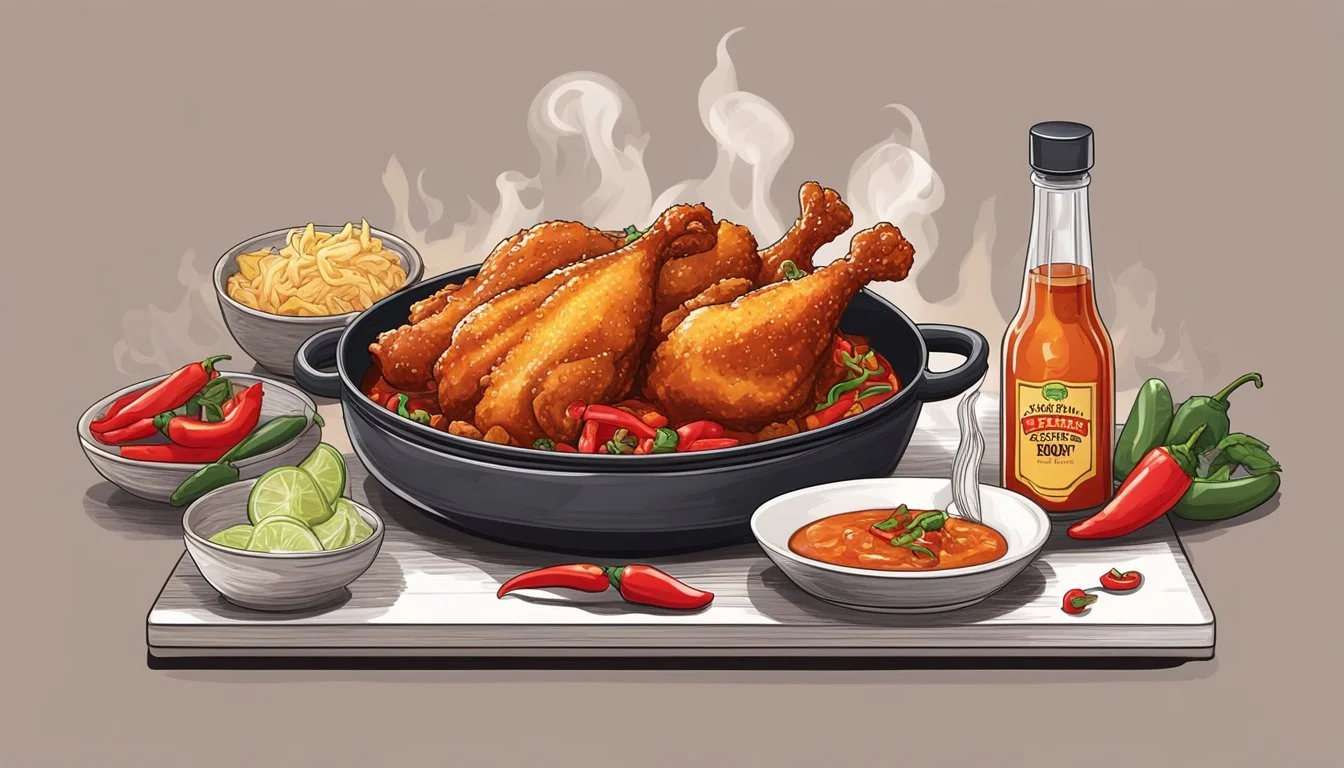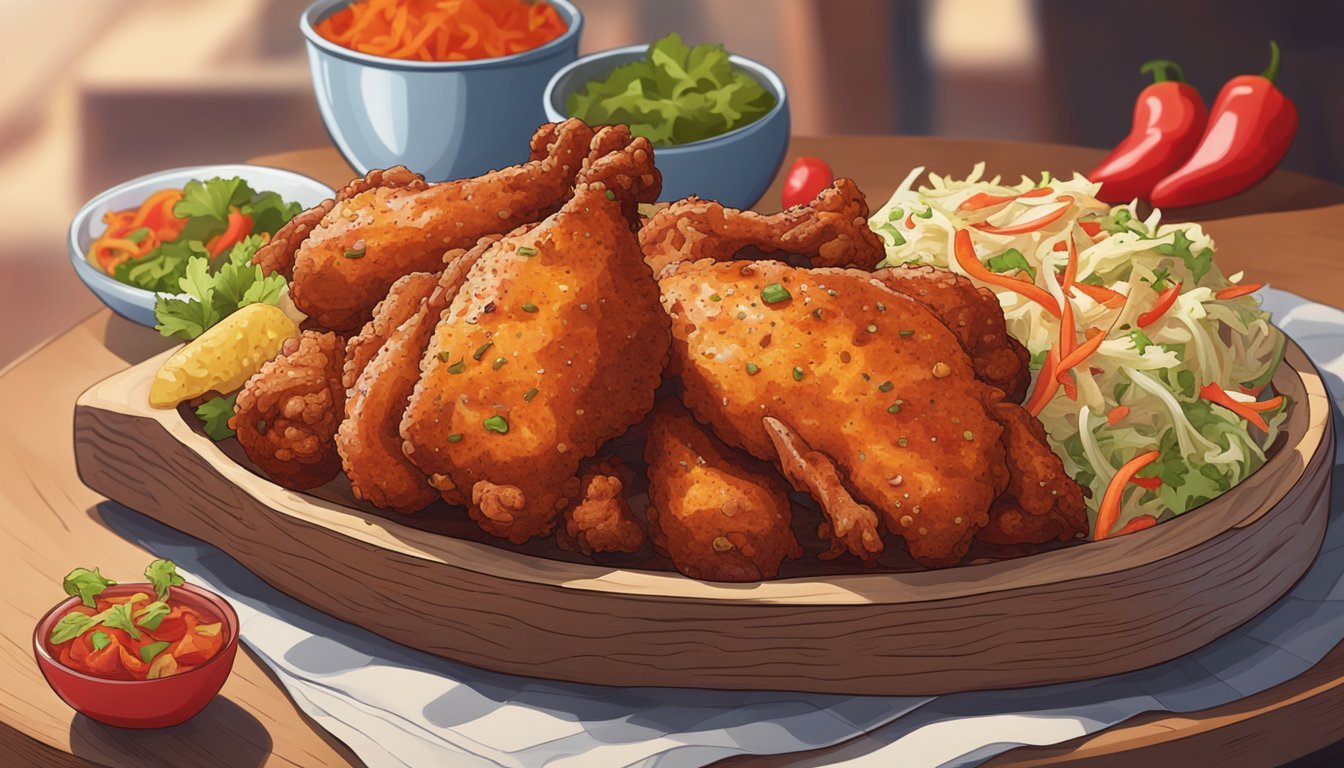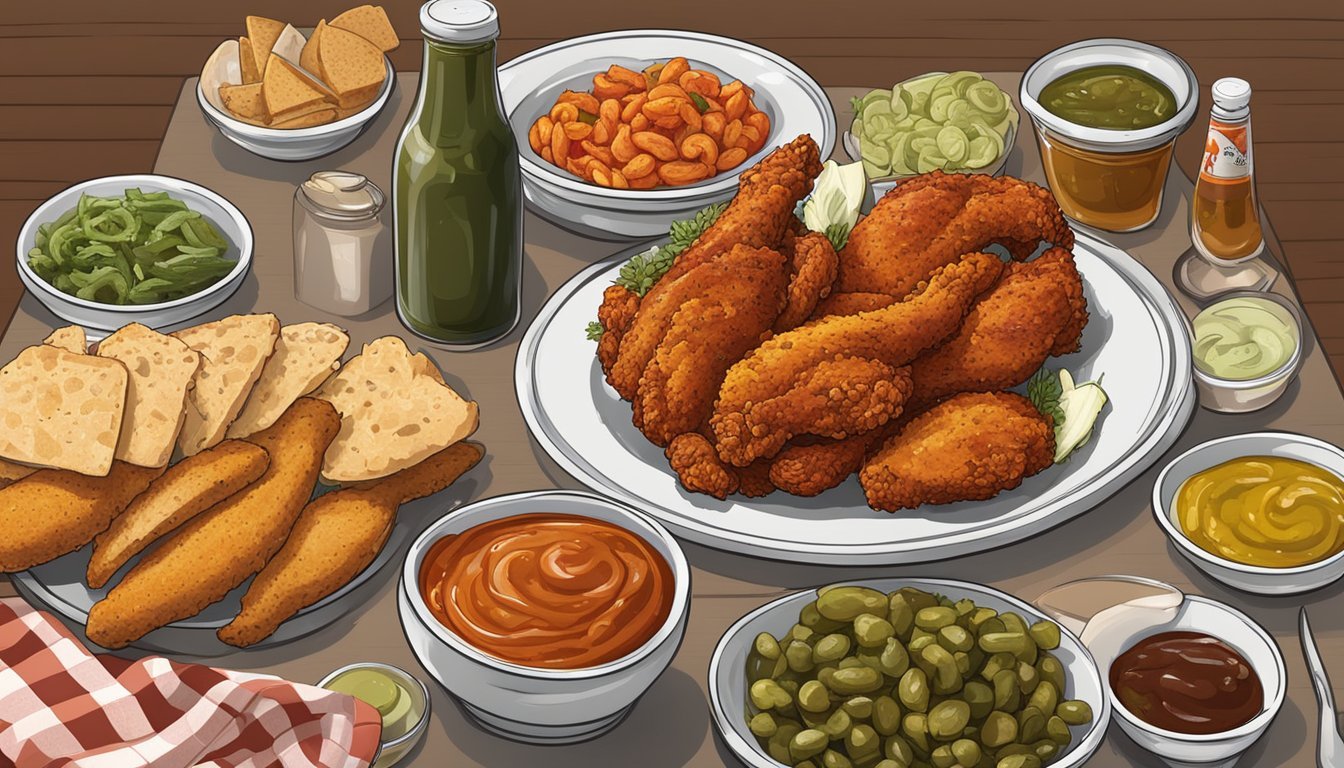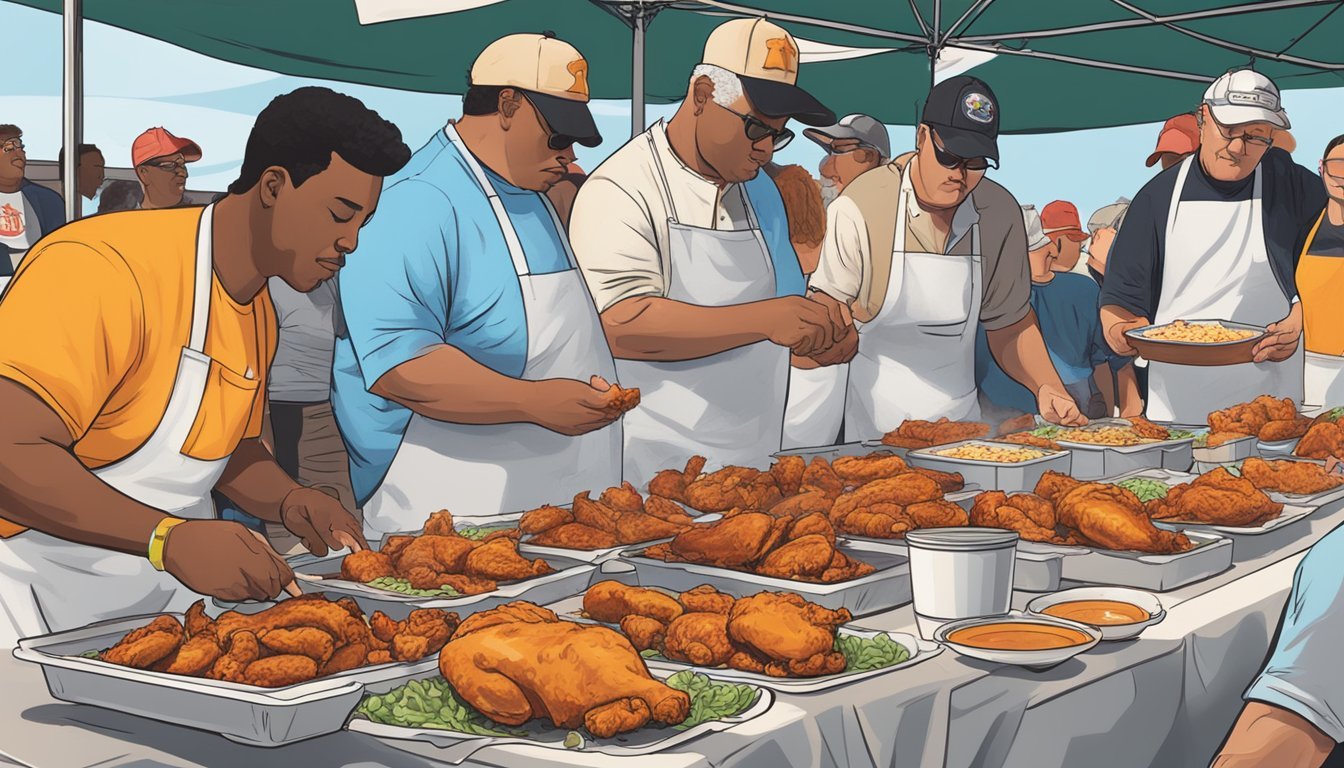Tennessee Hot Chicken Challenge
A Spicy Culinary Adventure
Tennessee's culinary world is renowned for a dish that combines the comfort of Southern fried chicken (how long does chicken last?) with a fiery twist. Hot chicken, a special preparation of fried chicken that is heavily seasoned with cayenne pepper and served atop white bread with pickles, has become a staple in Nashville's food scene. This local delicacy's reputation has spread, enticing both seasoned spice veterans and the culinary curious to partake in what has become known as the Hot Chicken Challenge, an opportunity for daring diners to test their limits against some of the spiciest chicken in the country.
Around the city of Nashville, numerous restaurants each offer their own version of this tongue-searing dish, with heat levels ranging from mild smolders to intense blazes that challenge even the most resilient palates. The Hot Chicken (how long does chicken last?) Challenge is not just a test of spice tolerance; it's a beloved cultural event that encapsulates the spirit of Nashville's community and culinary ingenuity. Participants can indulge in various interpretations of hot chicken during annual events such as Nashville Scene's Hot Chicken Week, where local eateries showcase their expertise with special hot chicken dishes, and diners vote on their favorites.
The draw of Nashville's hot chicken goes beyond the heat. It's a convergence of taste, tradition, and the thrill of the challenge, attracting food enthusiasts from all over to discover just how much spice they can handle. As more people embark on this culinary adventure, sharing their experiences through different mediums, such as YouTube, the legend of Tennessee's hot chicken continues to grow, promising all who dare to try it a uniquely flavorful and fiery experience.
The Origin of Nashville Hot Chicken
Nashville Hot Chicken's inception intertwines with tales of love and revenge, emerging as a Tennessee culinary staple. This fiery favorite is deeply rooted in Nashville's history and culinary landscape.
Historical Roots
Tennessee folklore tells of Thornton Prince, a man notorious for his womanizing ways, who became the unsuspecting originator of Nashville's hot chicken. According to family accounts, in a quest for vengeance due to his infidelities, Prince's lover reputedly served him a fried chicken breakfast with an excessive amount of pepper and spices. Contrary to the intentions of his scorned partner, Prince adored this spicy creation, which led to the birth of an original culinary delight in Nashville.
Influential Establishments
An essential pillar in the history of Nashville's hot chicken is the iconic Prince's Hot Chicken Shack – the establishment started by Thornton Prince's family. It is this revered spot that transformed a personal story of love and revenge into a widely cherished phenomenon. With decades of fine-tuning, Prince's has set the standard for authentic Nashville hot chicken, making it a must-visit institution for fiery fowl aficionados.
In the evolution of hot chicken, Prince's Hot Chicken Shack has not just been a pivotal establishment but also a reflection of Nashville's dedication to its regional flavors, ensuring that what began as a piquant punishment turned into a gastronomic legacy.
Understanding Hot Chicken
Hot chicken, a Nashville specialty, is a unique dish characterized by its spicy, crispy fried chicken served on white bread with pickles. This culinary delight balances heat with flavor, and has numerous recipe variations and traditional sides that contribute to its iconic status.
Core Ingredients
The core ingredients of hot chicken include:
Chicken: Typically breasts, thighs, legs, or wings.
Marinade: A blend of buttermilk, cayenne pepper, and other spices to tenderize and flavor the meat.
Breading: A mixture of all-purpose flour, garlic powder, paprika, salt, and additional cayenne to create the crisp exterior.
Heat Source: Predominantly cayenne pepper, but often with other hot spices.
Oil: For deep frying the chicken to achieve the desired crispness.
Recipe Variations
Recipe variations might include changes to:
Spice Level: Adjustments to the amount of cayenne pepper or the addition of other hot spices like chili powder.
Sweetness: Some recipes call for sugar or brown sugar in the flour mixture to add a subtle sweetness that contrasts the heat.
Fat: Butter is sometimes included in the spicy coating to add richness.
Alterations in the marinade, such as using different acids or dairy products, can also vary flavor profiles.
Accompanying Sides
Traditional sides that complement hot chicken are:
White Bread: A simple slice of bread placed beneath the chicken to absorb the juices and spices.
Pickles: Usually dill (how long does dill last?) pickles, providing a tangy contrast to the heat.
Coleslaw: Creamy or vinegary slaw to balance the spicy flavor with a cool, crisp texture.
Potato Salad: A creamy, cold side to soothe the palate.
These sides are not just garnishes; they enhance the meal and offer reprieve from the chicken's fiery spices.
The Art of Cooking Hot Chicken
Crafting Nashville hot chicken is a culinary process that demands meticulous attention to detail, from preparation to frying, and even cleanup. The following subsections break down the critical steps involved in mastering the art of hot chicken.
Preparation Techniques
To begin, chefs combine a blend of flour, kosher salt, and black pepper for the chicken's breading base. An egg and milk mixture serves as the wet dredge which ensures the coating adheres properly. Beforehand, the chicken should be generously seasoned, allowing the flavors to permeate the meat.
Frying Methods
The choice of cooking oil greatly influences the texture and flavor of hot chicken. High smoke point oils like peanut oil or canola oil are commonly used for their stability at high temperatures. Chefs often opt for a cast iron skillet or Dutch oven for even heat distribution. The chicken is cooked at a consistent temperature, usually between 325°F to 375°F, which a meat thermometer or instant-read thermometer can verify.
Safety and Cleanup
After frying, safely transfer the chicken using tongs to prevent burns. Allow used frying oil to cool before straining and discarding or reusing it. Prompt cleanup with grease-cutting detergents helps maintain a safe cooking environment and prolongs the life of cooking tools.
Hot Chicken Culture and Community
Tennessee's hot chicken is not just a dish; it's a cornerstone of community bonding and a testament to Southern culinary traditions. This section delves into the beloved local hotspots where this fiery fare is served and examines the burgeoning trends that continue to stoke its popularity.
Local Hotspots
Nashville, the heartland of hot chicken, boasts an array of restaurants where the dish is not just food, but an experience. Prince's Hot Chicken, often cited as the original and defining establishment of hot chicken, has created a cult following with patrons willing to endure long lines for a taste of its legendary spice-laden chicken.
Adjacent to Prince's in the pantheon of heat is Hattie B's Hot Chicken, a relative newcomer that has swiftly garnered a loyal fan base. With multiple locations across Nashville, Hattie B's takes a family-friendly approach to its menu while still delivering the mouth-searing heat that aficionados seek.
Pepperfire also stands out with its innovative takes on the classic recipe, integrating unique flavors and providing a modern twist to the tradition.
Most Popular Hot Chicken Restaurants in Nashville:
Prince's Hot Chicken
Hattie B's Hot Chicken
Pepperfire
Each location has its own story, steeped in the rich history of Southern cuisine, making them must-visit spots for both locals and travelers seeking the authentic Nashville hot chicken experience.
Popularity and Trends
The craze for hot chicken has escalated beyond the bounds of Tennessee, with the dish gaining recognition nationwide. The distinctively Southern spicy chicken has been embraced by new audiences, leading to a proliferation of hot chicken eateries sprawled across various cities.
Moreover, the popularity has grown such that restaurants dedicated to hot chicken are now an established part of trendy urban food scenes. The "best" hot chicken has become a heated debate, propelling the dish into a cultural phenomenon that extends far beyond Nashville's confines.
Trends Influencing Hot Chicken's Popularity:
Expansion of hot chicken restaurants across the US
Inclusion on menus in non-Southern eateries
Featured in food competitions and television shows
These restaurants serve not just food, but stories of heritage, offering a window into the flavorful saga of the South and its Restaurants' resilience. Each bite is a reminder of the dish's humble beginnings and its journey into the spotlight of mainstream culinary appreciation.
Pairing and Serving Suggestions
When serving Nashville Hot Chicken, the key is to balance the dish's fiery heat with complementary sides and condiments that can provide relief, texture, and contrast.
Bread and Condiments
Pairing Nashville Hot Chicken with the right bread and condiment options is essential. White bread is traditional because it absorbs the excess oil and spice from the chicken, providing a mellow flavor counterpoint. One can also consider a range of condiments that add a cooling element or zesty touch to the dish. For instance, a creamy dill pickle sauce or a simple mayonnaise spread offers a cooling effect that can alleviate the heat, whereas dill pickle slices insert a tangy crunch.
Side Dishes
A variety of side dishes can complement the spiciness of Nashville Hot Chicken. Coleslaw, with its creamy and tangy profile, acts as a refreshing palate cleanser. Rich, comforting sides like Mac and Cheese can provide a calming, cheesy respite from the heat. Cornbread, slightly sweet and fluffy, pairs wonderfully for its absorptive qualities and flavor profile. For those preferring their sides in the form of vegetables, Corn on the Cob or Fries like crispy French fries or even Potato Salad can round out the meal with different textures to enjoy.
Handling and Enjoying the Heat
When tackling Tennessee's hot chicken challenges, one's enjoyment hinges on their ability to handle the fiery sensation. Novices and veterans alike seek strategies to manage the heat while savoring the bold flavors.
Tips for Beginners
Start Small: One should begin with milder heat levels to develop a tolerance. Portion Control is key—eating smaller pieces allows the individual to adjust gradually to the spice.
Buttermilk Prep: Marinating chicken in a Buttermilk Mixture and refrigerating it overnight can help temper the heat. The buttermilk acts as a buffer against the intensity of the spices.
Cooling Strategies
Milk: A sip of milk can provide instant relief from the heat. Because milk contains casein, it effectively binds with capsaicin, the compound responsible for the spicy sensation, and washes it away.
Coleslaw: A side of coleslaw not only adds texture and flavor contrast but can also aid in cooling the palate. It's a refreshing companion to the spiciness of hot chicken.
Handling the heat from a Nashville Hot Chicken challenge involves both preparation and immediate cooling strategies. Utilizing milk and its derivatives for marination and relief, combined with a crisp serving of coleslaw, can enhance one's experience, balancing the fiery kick with soothing coolness.
Beyond the Traditional Plate
Tennessee's hot chicken has evolved beyond the traditional presentation, finding its way into an array of innovative dishes that celebrate the state's culinary creativity.
Tennessee-Inspired Creations
In Nashville, chefs have pushed the boundaries of the classic hot chicken dish by incorporating the spicy, fried treat into an assortment of menu items. Pizza, a perennial favorite, is reimagined with toppings of succulent chicken tenders drenched in that signature hot chicken spice blend. It's not uncommon to find a slice that masterfully blends the heat of hot chicken with the familiar, comforting flavors of mozzarella and tomato sauce.
Exploring further, one might encounter cornbread that has been invigorated with bits of hot chicken, creating a delightful contrast of sweet and fiery tastes in every bite. This innovative take on a Southern staple marries the moistness of cornbread with the zest of hot spices.
In Franklin, a city known for its respect for culinary traditions, local chefs marinate their chicken tenders in a unique mixture of spices, ensuring that the heat permeates every delicious morsel. This technique not only intensifies the flavor but also tenderizes the chicken, making it a standout ingredient in any dish.
Additionally, creative utilization of leftovers brings about unexpected twists on comfort foods, such as hot chicken-topped loaded fries or even a spicy hot chicken chili that warms from within. Restaurants across Tennessee have taken to utilizing every flavorful piece of hot chicken to ensure that the joy of this local delicacy can be savored in countless forms.
Store-Bought Versus Homemade
When considering the preparation of Nashville Hot Chicken, individuals face a choice between the convenient commercial offerings and the customizable adventure of making the dish at home.
Commercially Available Options
Commercially available Nashville Hot Chicken provides a quick and appealing option for those craving this Southern delicacy without the time or desire to cook. Customers can purchase this deep-fried chicken from a variety of restaurants and even some supermarkets, each with their own recipe claiming to be the best and most delicious version of the original dish. For those conscious about dietary restrictions, store-bought options may contain gluten, and the level of heat might not be optional.
Here is a comparison of features often found in store-bought Nashville Hot Chicken:
Feature
Convenience
Consistency
Gluten Content
Oil Used
Description
Ready to eat with no preparation required.
Uniform taste and quality each time.
Likely present, though gluten-free options may be available.
Often deep-fried in vegetable oil or canola.
The Homemade Experience
Homemade Nashville Hot Chicken allows for a highly personalized touch to the recipe. The cook has full control over the level of spiciness, the choice of oil for frying, and the potential to eliminate gluten if needed by substituting the flour. Using a large deep skillet, foodies and chefs alike can craft a batch of chicken that is exceptionally crispy, often dubbed the crispiest in texture.
The typical process of making this dish at home would involve:
Brining the chicken.
Preparing a blend of spices.
Dredging the chicken in flour (gluten-free optional).
Deep-frying in a preferred oil, such as canola.
Adding the spicy coating to the chicken.
Affiliate links to various homemade recipes or cookware are often found in online cooking guides, offering additional resources to the reader.
While homemade preparation is more time-consuming, it separates enthusiasts from casual fans through dedication to creating a potentially healthier and custom-tailored version of Nashville Hot Chicken.
Spreading the Hot Chicken Love
Tennessee's hot chicken isn't just a dish; it's a cultural experience that has forged its story through years of tradition and a burgeoning love for all things spicy and crispy. Restaurants across the state—and beyond—are making it a mission to make this fiery favorite widely available.
Making Hot Chicken Accessible
Pepperfire has taken the hot chicken experience to new heights, expanding its reach to accommodate the increasing demand. With a diverse menu that caters to different spice levels, they have crafted an inclusive atmosphere where anyone can partake in the challenge of finding their perfect heat threshold.
Hattie B's Hot Chicken, a name synonymous with Nashville's culinary scene, ensures that not only Tennesseans but also visitors from far and wide have access to their mouthwatering, deep-fried specialties. They have gone the extra mile by spreading their locations to several key cities, each serving up that distinct hot chicken flavor that is both a life-affirming challenge and an unmissable dining experience.
Prince’s Hot Chicken, the originator of the Nashville hot chicken, provides an authentic taste of history with each bite. Their commitment to quality and respect for tradition resonate in the long lines of devoted customers and the vivid stories they share. It's the love for that original hit of spice and the crispy, savory crust that keeps patrons returning, eager to relive the experience, or introduce it to someone new.
The phenomenon of Tennessee hot chicken continues to spread, drawing in both the spice aficionado and the culinary curious. Each crispy piece is not simply food; it's a narrative of Tennessee, its love for bold flavors, and the inclusive community spirit that is encapsulated in the sharing of this beloved dish. With each new location that opens its doors, the best of Tennessee's hot chicken becomes accessible to more people, spreading the love one fiery serving at a time.
Health Aspects and Considerations
In analyzing the health considerations of Tennessee's hot chicken tradition, one finds an intricate balance of indulgence and nutrition. This dish, deeply rooted in Southern culture, often incorporates ingredients like cayenne pepper and butter, conveying both flavor and caloric density.
Nutritional Overview
Hot chicken, a beloved staple of Southern cuisine, brings together a symphony of flavors that also impact nutritional content. The use of cayenne pepper is not only for taste; it contains capsaicin which may boost metabolism and offer anti-inflammatory benefits. However, these healthful aspects can be overshadowed by the method of preparation which typically involves frying.
The nutritional implications of such a cooking process are significant; the chicken is usually bathed in butter or lard before being coated in seasoned flour and spices, leading to a calorie-dense meal. A single serving of Nashville hot chicken can contain a substantial amount of fat, including saturated fats.
Despite the hearty flavors and the love of tradition that hot chicken brings to the table, those with dietary restrictions or health-conscious lifestyles should consume it in moderation. This dish is a true testament to Southern gastronomy and part of its cultural life, but its indulgent nature calls for mindful consideration to maintain a balanced diet.
Conclusion
Tennessee's hot chicken stands as a testament to the state's culinary innovation and the Southern experience. Its origins are deeply rooted in Nashville's culture, resonating with those who love a fiery kick to their meals. Food enthusiasts often consider Nashville the best place to experience this spicy delight, with the recipe for hot chicken being a guarded treasure of the local community.
When visitors bite into this Southern fare, they are not just tasting a dish; they are partaking in a piece of Tennessee's history. The experience is akin to a challenge, inviting diners to embrace the heat and discover their own threshold for spice. The profound connection between hot chicken and Nashville highlights how regional cuisine can offer insight into the character of a place.
For many, the appeal lies in the balance of flavor and spiciness—a signature characteristic that confirms a genuine Nashville hot chicken dish. Restaurants across Tennessee have embraced this local favorite, ensuring that anyone who seeks it can participate in this authentic culinary experience.
In partaking in the hot chicken challenge, one joins a community that values tradition, flavor, and the excitement that comes with dining on a meal that is boldly, unabashedly Tennessee.









